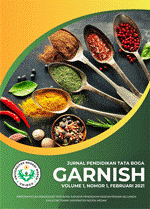Pengaruh Model Pembelajaran Kooperatif Terhadap Hasil Belajar Boga Dasar Siswa SMK Pariwisata Imelda Medan
DOI:
https://doi.org/10.24114/gni.v3i1.26335Abstract
Penelitian ini bertujuan untuk mengetahui: (1) Hasil belajar siswa yang menggunakan model pembelajaran Kooperatif pada mata pelajaran Boga Dasar; (2) Hasil belajar siswa yang tidak menggunakan model pembelajaran Kooperatif pada pelajaran Boga Dasar; (3) Pengaruh model pembelajaran kooperatif pada mata pelajaran Boga Dasar. Desain penelitian yang digunakan adalah quasi eksperimen. Lokasi penelitian di SMK Pariwisata Imelda Medan dengan jumlah populasi sebanyak 60 orang. Sampel kelas penelitian diambil dengan teknik Total sampling terdiri dari 2 kelas berjumlah 60 orang. Teknik pengumpulan data menggunakan rubrik pengamatan. Teknik analisis data menggunakan deskripsi data, uji kecenderungan, uji normalitas dengan menggunakan Chi Kuadrat, uji homogenitas, dan uji hipotesis dengan menggunakan uji t. Hasil penelitian ini menunjukan bahwa tingkat kecenderungan hasil belajar menggunakan model pembelajaran kooperatif pada mata pelajaran bBoga Dasar termasuk kategori tinggi dengan persentasi sebesar 70 persen dan tingkat kecenderungan hasil belajar yang tidak menggunakan model pembelajaran kooperatif pada mata pelajaran Boga Dasar termasuk kategori cukup dengan persentasi sebesar 70 persen. Hasil uji normalitas dari kedua kelas dengan dk=5 persen adalah berdistribusi normal, pada kelas yang menggunakan model pembelajaran kooperatif Xhitung < Xtabel (4,7 < 11,070) dan pada kelas yang tidak menggunakan model pembelajaran kooperatif dengan Xhitung < Xtabel (7 < 11,070). Hasil uji homogenitas mata pelajaran Boga Dasar Fhitung < Ftabel (1,05 < 3.33) artinya hasil belajar kedua kelompok homogen. Dan berdasarkan hasil analisis uji t menunjukan bahwa terdapat pengaruh yang signifikan pada penggunaan model pembelajaran kooperatif terhadap hasil belajar Boga Dasar dengan nilai thitung ttabel (2.6 1,671) dengan taraf signifikan 5 persen. Artinya, model pembelajaran kooperatif dapat mempengaruhi hasil belajar siswa pada mata pelajaran Boga Dasar. Kata Kunci : Model Pembelajaran Kooperatif, Hasil Belajar, SMKABSTRACTThis study aims to determine: (1) the learning outcomes of students who use the Cooperative learning model in Basic Catering subjects; (2) the learning outcomes of students who do not use the Cooperative learning model in Basic Cooking lessons; (3) The effect of cooperative learning model on Basic Culinary subjects. The research design used is quasi-experimental. The research location is at SMK Wisata Imelda Medan with a total population of 60 people. The sample of the research class was taken with a total sampling technique consisting of 2 classes totaling 60 people. The data collection technique used the observation rubric. The data analysis technique used data description, trend test, normality test using Chi Square, homogeneity test, and hypothesis testing using t test. The results of this study indicate that the level of tendency of learning outcomes using cooperative learning models in Basic Cooking subjects is included in the high category with a percentage of 70 percent and the level of tendency for learning outcomes that do not use cooperative learning models in Basic Cooking subjects is included in the sufficient category with a percentage of 70 percent. . The results of the normality test of the two classes with dk = 5 percent were normally distributed, in the class that used the cooperative learning model Xcount < Xtable (4.7 < 11,070) and in the class that did not use the cooperative learning model with Xcount < X table (7 < 11,070) . The results of the homogeneity test of Basic Catering subjects Fcount < Ftable (1.05 < 3.33) means that the learning outcomes of the two groups are homogeneous. And based on the results of the t-test analysis showed that there was a significant effect on the use of cooperative learning models on learning outcomes of Basic Catering with a value of tcount > ttable (2.6 > 1.671) with a significant level of 5 percent. That is, the cooperative learning model can affect student learning outcomes in Basic Cooking subjects.Keywords: Cooperative Learning Model, Learning Outcomes, SMKReferences
Andayani. 2015. Problema dan Aksioma dalam Metodologi Pembelajaran.
Anwar, Muhammad. 2015. Filsafat Pendidikan. Jakarta : Kencana
Arikunto, S. 2015. Prosedur Penelitian, Suatu Pendekatan Praktek, (Rev. Ed). Jakarta: PT. Rineka Cipta.
Arikunto, S. 2010. Prosedur Penelitian suatu Pendekatan Praktik. Jakarta: Rineka Cipta
Aris, Shoimin. 2014. 68 Model Pembelajaran Inovatif. Yogyakarta : Ar-Ruzz Media
Astiti, Kadek Ayu. 2017. Evaluasi Pembelajaran. Yogyakarta : Andi
Dyson, Ben & Casey, Ashley. 2016. Cooperative Learning in Physical Education and Physical Activity. New York : Routledge
Hamalik. (2015), Proses Belajar Mengajar, Bumi Aksara, Jakarta.
Istarani. 2016. 58 Model Pembelajaran . Bandung : CV Alfabeta.
Miftahul, Huda. 2015. Model-Model Pengajaran dan Pembelajaran. Yogyakarta : Pustaka pelajar
Rusman. 2017. Belajar dan Pembelajaran Berorientasi Standart Proses Pendidikan. Jakarta: Kencana
Sudiyono, Anas. 2016. Pengantar Evaluasi Pendidikan. Bandung : Rajawali
Sudjana, 2016. Metoda Statistika. Bandung : Penerbit Tarsito
Sukestiyarno. 2014. Statistika Dasar. Yogyakarta. Andi.
Susanto, Ahmad. 2016. Teori Belajar dan Pembelajaran di Sekolah Dasar. Jakarta : Prenadamedia Group.
Trianto. 2016. Mendesain Model Pembelajaran Inovatif “ Progresif. Surabaya: Kencana Prenada Media Group. Yogyakarta : Penerbit Deepublish “ CV Budi Utama.

